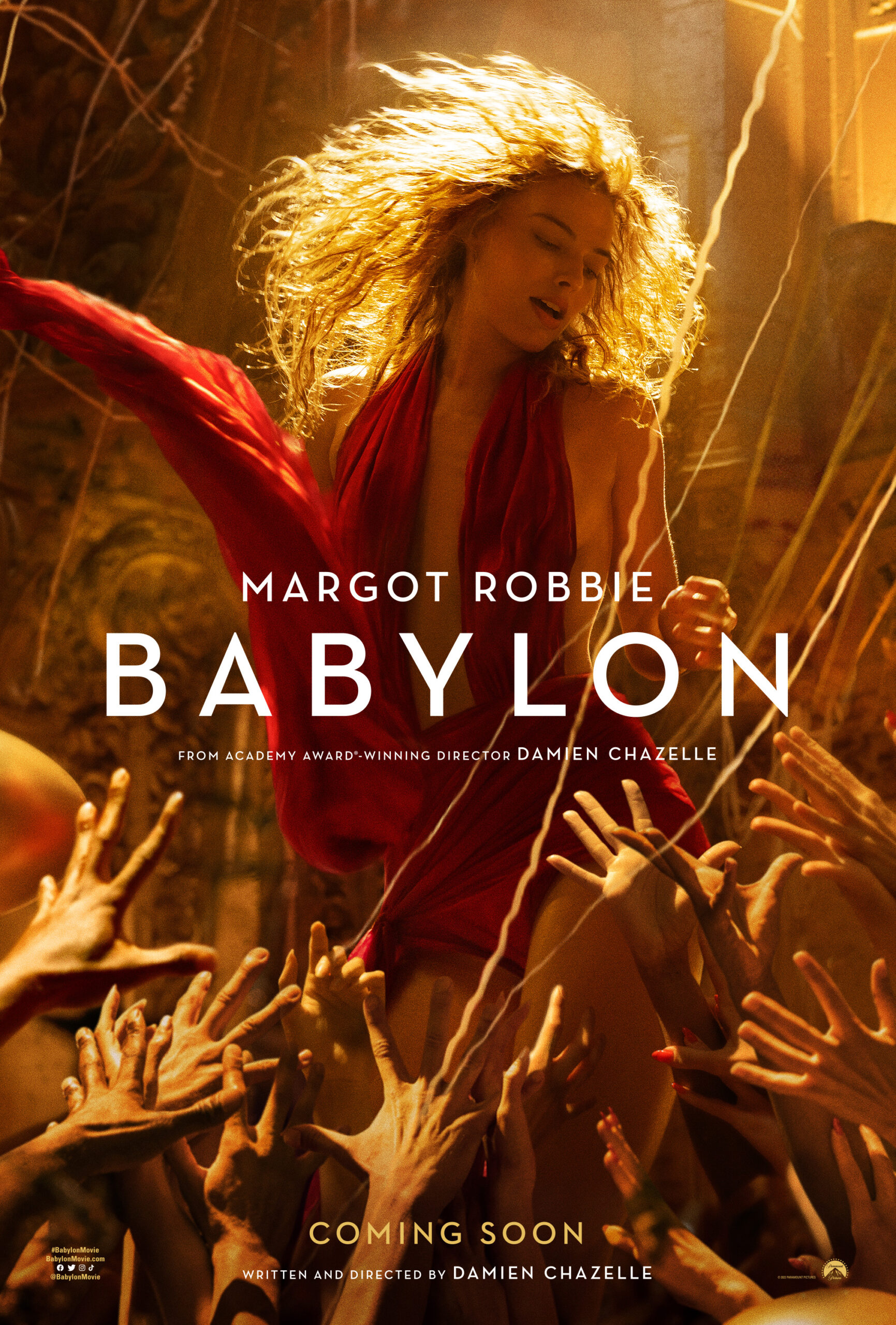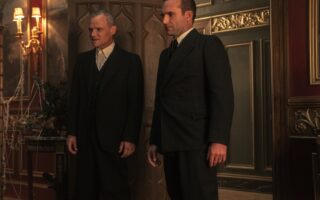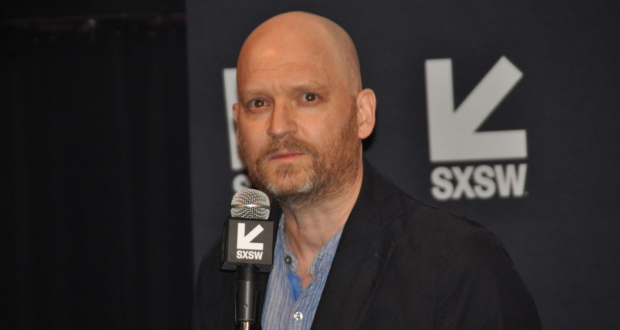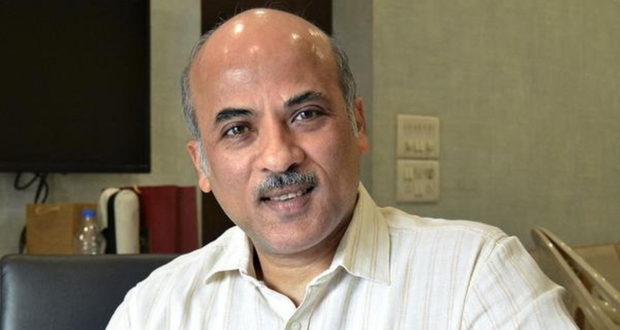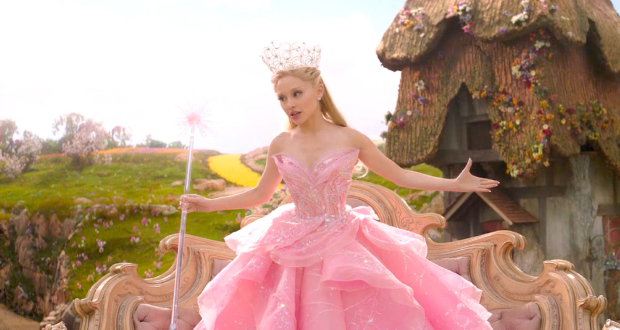“Babylon” is Damien Chazelle’s salute to the movies, following on the heels of Sam Mendes’ similar homage to the film in “Empire of Light.”
I’ve never met Sam Mendes, although I admire his work. But I met Damian Chazelle, when he came to Chicago for the premiere of “La La Land” at the 52nd Chicago International Film Festival on October 13, 2016. Damien Chazelle is a genuine, personable, interesting young man. Once again he has partnered with longtime collaborator Justin Hurwitz (who also did the music for “La La Land” and “Whiplash”). The “Babylon” score was very reminiscent of the music from “La La Land.”
Babylon attempts to depict what Hollywood might have been like back when the silent movie era was giving way to talkies. It is both an homage to those chaotic times, beginning in 1926, and a criticism of the excesses of Hollywood. In fact, the opening 20 minutes, depicts an elephant being transported to an orgy hosted by someone seemingly based on Fatty Arbuckle. The golden shower scene, gross as it is, goes a long way toward illustrating those Hollywood excesses. It’s way over the top. You could say that about the entire film.
One of the things that amazes me about this $80 million-dollar stroll down memory lane, is the cast. In addition to Brad Pitt as the male lead and Margot Robbie as the female lead, it seems like there are bit parts for a myriad of actors, both known and unknown. Who were these masked men (and women)?
Flea has a part. Eric Roberts—who I interviewed on my WeeklyWilson podcast during the pandemic—plays Margot Robbie’s father. Lukas Haas who played the small boy in “Witness” when he was 9 in the seventies, plays George, Brad Pitt’s best friend. Tobey Maguire, listed as an executive producer, has a truly hero-destroying role as a gangster. Spike Jonze plays Otto. Michael Dukakis has an uncredited part as a soldier. Anna Chazelle has an uncredited part as Bobbie Hart. Kaia Gerber, the look-alike daughter of Cindy Crawford, has a bit part at some point. Jovan Adepo plays jazz trumpeter Sidney Palmer. Jean Smart (“Hacks”) plays a composite character based on columnists Hedda Hopper and Louella Parsons, Elinor O’Toole. Max Minghella (“The Handmaid’s Tale’s Nick Blaine) plays Irving Thalberg. Comedian/actor Jeff Garlin (“Curb Your Enthusiasm”) plays Don Wallach, and Ethan Suplee (“Remember the Titans” 2000) plays Wilson and spends most of his time onscreen spitting grossly. Manny Liotta plays a P.A. (Production Assistant). This is a very partial list of the surprisingly elaborate cast list. (Hard to stage an orgy without a crowd, I guess.)
But the main character whose work in the lead is impressive as Manny Torres is relatively unknown Mexican actor Diego Calva, who comes to the screen in a major part as a complete unknown to U.S. audiences. Calva played a drug lord on Netflix’s “Narcos: Mexico” but, if you missed that, you missed him. He came to his star-making part in much the same way as the fictional Manny Torres: by doing whatever anyone in the movie business needed to be done. Diego Calva reminded me of the “fixer” characters played by Harvey Keitel in “Pulp Fiction” or by Leiv Schreiber in “Ray Donovan.” He has been nominated for a Golden Globe (if that award still means anything.)
On an appearance on Jimmy Kimmel’s late-night television show, Calva shared some behind-the-scenes insights into Babylon and into his own background. Diego learned to speak English specifically for “Babylon.” Calva learned English from playing “Pokemon” video games in Mexico. He confirmed that the chicken in the orgy scene was a great actor. He also confirmed that they used a chicken puppet for some takes. Diego admitted he was most excited to meet Tobey Maguire since he had been a “Spiderman” fan from a young age.
Among other comments the young actor made was this one about the opening orgy scene: “It was so crazy. I’ve never been surrounded by so many naked people before.” Of his co-star and love interest in the film, Margot Robbie, Diego said: “She’s always going to do the unexpected. She’s a fearless actress, just full-on energy. When you’re so tired, she can play it 100 times more.” Diego studied at the Centro de Capacitacion Cinematografica in Mexico. He is a talent to watch.
The thing that resonated with me—especially since it was quite similar to Sam Mendes’ musings on the movies—were the lines that pin down Chazelle’s feelings about the film. It’s not unique among creative types, whether filmmakers, writers, songwriters, or painters that the work we leave behind gives us a little bit of immortality. Ideally, whatever we have been responsible for as creative artists has been good and it remains long after we are gone.
Chazelle scripted one scene, in particular, between Jean Smart and Brad Pitt where she tells the fading screen star “Your time has run out. There is no why. Babylon is bigger than you. No one asks to be left behind.” Telling him how he will live forever on celluloid, the columnist says, “You’ve been given a gift. Be grateful.” Pitt’s character, in an earlier scene, states, “What I do means something to millions of people. For real people, on the ground, it means something.” He then tells Olivia Wilde’s character (Ina) to spare him the pretentious notes on his reading of a script, expressing disgust for those who try to characterize Babylon as “a low art” and, instead, enshrine Ibsen and Strindberg and the theater.
The general critical consensus has been bad for the film among both critics and audiences. I understand that, as so many of the scenes are well over-the-top and, I’m sure, offensive to some. The opening scene with the elephant and the elephant dung is but one example. There is a later one involving Margot Robbie at a party rejecting the instructions to be “elegant”. She tries but fails, to “act” respectable since her original nickname was “the wild child.” Now, she is to eschew her Jersey roots and act much more well-behaved. She rejects that advice. She literally smears food all over her face, insults everyone at the party, and, ultimately, projectile vomits both outside the house and inside on a newly-purchased expensive rug. It’s a bit much. Between the descent into the depths of Los Angeles that Tobey Maguire insists Manny and his companion must take, the elephant scene, the vomiting, and the golden shower scene at the orgy, the film was just too far over the top.
Babylon cost $80 million. When you see the voluminous cast list, it isn’t surprising. Not only does it have two of the biggest current stars in Hollywood (Pitt and Robbie) but it seems to have everyone else who might have been hanging around. My favorite was the inclusion of Eric Roberts, who is undoubtedly going to hold the record for most American movie appearances ever. Eric has a scene with a snake, which is pretty funny.
However, a lot of the scenes were not funny and, instead, screamed gross. You get the feeling that the creative license to try new things led to throwing everything but the kitchen sink into the movie.
Another factor that swelled the film’s length from a normal hour and a half to over three hours was the emphasis on the music. Chazelle has highlighted the music of collaborator Justin Hurwitz. Although the trumpet player character Sidney Palmer (Jovan Adepo) admitted that he did not really play the trumpet, the film focuses on the band and its performances too long. The movie would have benefited from some judicious editing and shorter musical interludes.
The performances, especially those of Pitt, Robbie, and Diego Calva, are good. The plot, supposedly based on the 1959 Kenneth Anger book “Hollywood Babylon,” was outrageous, but many of the stories in that novel have been debunked. The cinematography by Linus Sandgren is great and the set decoration by Anthony Carlino deserves mention. Opening on Christmas Day against “Avatar” might have been a questionable move. Chazelle even pays tribute to many iconic films in a final montage of clips from various movies, including “Avatar,” and those flickering images even caused a warning to be posted outside our theater.
Babylon is too long. Some of the musical pieces could have been shortened. Removing some of the scenes that depict how difficult it was for silent movie actors to learn the new way of making talkies (by doing a takeover and over and over) could have been omitted. Grossing out the audience over and over succeeded, to the film’s detriment. The sets and costumes and cinematography are great.
“Babylon” was a great creative effort. It just didn’t work.
